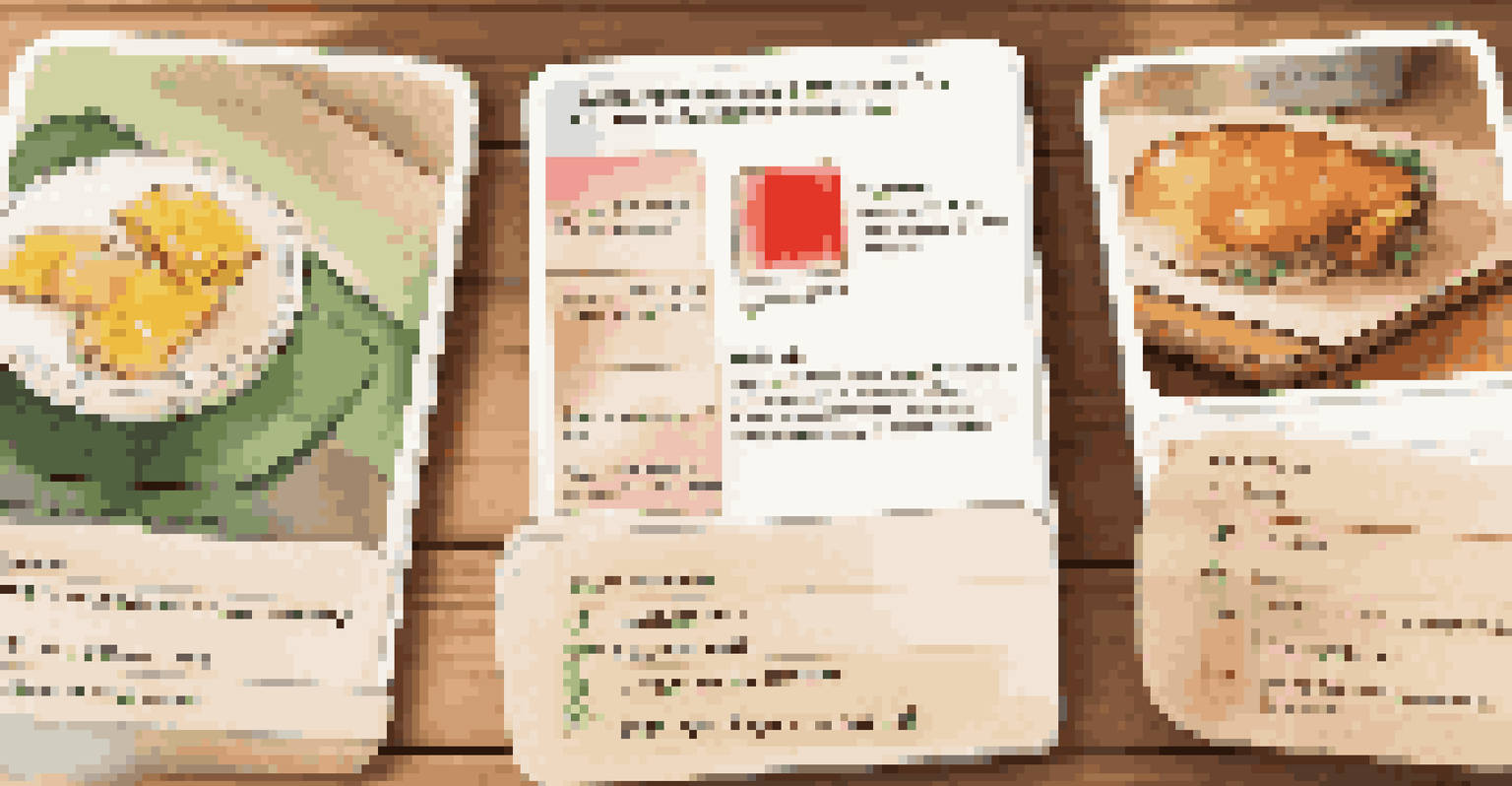Preparing for Travel with Dietary Restrictions: A Checklist

Understanding Your Dietary Restrictions Before Travel
Before embarking on any journey, it’s crucial to fully understand your dietary restrictions. Whether you’re gluten-free, vegan, or have food allergies, knowing what you can and cannot consume will help you make informed choices while traveling. This clarity will not only ease your mind but also enhance your travel experience.
Traveling – it leaves you speechless, then turns you into a storyteller.
Take the time to research the types of foods available at your destination. Some regions may have more options than others, so being prepared can save you from frustration later on. Also, you might want to consider reaching out to local restaurants or markets in advance to inquire about their ability to accommodate your needs.
Lastly, consult with a healthcare professional if you have any uncertainties. They can offer valuable advice tailored to your specific situation, ensuring that you’re well-prepared for your trip. Being proactive in understanding your dietary needs sets the stage for a smoother travel experience.
Create a Comprehensive Packing List for Food
Creating a packing list is an essential step when traveling with dietary restrictions. Start by listing non-perishable snacks that fit your dietary needs, such as protein bars, nut mixes, or dried fruits. These can be lifesavers when you find yourself in a situation where suitable food isn't readily available.

Don't forget to include any necessary cooking equipment if you’re traveling to a location with limited food options. A portable blender or a small stove can help you prepare meals that cater to your dietary requirements. This way, you can control what goes into your food and avoid surprises.
Know Dietary Needs Before Traveling
Understanding your dietary restrictions helps you make informed choices and enhances your travel experience.
Additionally, consider packing kitchen essentials like utensils and storage containers. Having these items handy will make meal prep easier and help you avoid the temptation of grabbing unhealthy or unsuitable snacks on the go.
Research Food Options at Your Destination
Prior to your trip, dive into researching food options available at your destination. Look for local restaurants that specialize in or are known for accommodating dietary restrictions. Websites and travel apps can offer reviews from others with similar needs, making it easier to find suitable dining spots.
The journey of a thousand miles begins with one step.
Additionally, explore grocery stores and markets in the area. Knowing where to find safe food can be a game-changer, especially if you prefer to prepare your meals. Many cities now have health food stores or farmer's markets that cater to various dietary lifestyles.
Don't hesitate to reach out to locals online through forums or social media groups. Engaging with individuals who live in the area can provide you with insider tips on the best food spots and hidden gems that might not be in the travel guides.
Prepare Your Dietary Communication Cards
Having dietary communication cards can be invaluable when dining out or interacting with food vendors. These cards should clearly state your dietary restrictions in the local language, ensuring that servers understand your needs. This can eliminate any confusion and help you feel more secure about what you’re eating.
You can create these cards at home before your trip. Include essential information about what you can’t eat, as well as safe alternatives. This proactive approach allows you to communicate effectively without having to explain your situation repeatedly.
Pack Essential Food Supplies
Creating a packing list of safe snacks and cooking tools ensures you have suitable food options during your trip.
Additionally, keep a digital copy on your phone. This ensures that you have access to your dietary needs even if you misplace the physical cards. Having this backup can ease any anxiety you may feel when dining out.
Consider Bringing Your Own Food Supplies
When in doubt, bringing your own food supplies can provide peace of mind while traveling. Pack items that you know are safe and enjoyable for you, such as meal replacements or favorite snacks. This can serve as a buffer during long travel days when finding suitable food might be challenging.
Make sure to comply with airline regulations regarding food items if you're flying. Some airlines allow you to bring your own meals, while others have specific restrictions. Familiarizing yourself with these guidelines can save you from last-minute surprises at the airport.
Additionally, if you're traveling internationally, check the customs regulations regarding bringing food into the country. Knowing what’s permissible will help you navigate any potential issues and keep your travel experience stress-free.
Stay Flexible and Open to Alternatives
While it’s essential to be prepared, it’s equally important to remain flexible and open to alternatives. Sometimes, you may not find the exact food items you planned for, and that's okay! Embracing this flexibility can lead to unexpected culinary adventures and new discoveries.
Consider adjusting your meal plans based on what’s available locally. You might come across a new favorite dish that aligns with your dietary restrictions, which can enrich your travel experience. Being open-minded can turn a potentially stressful situation into a delightful exploration.
Stay Flexible with Food Options
Being open to local alternatives can lead to delightful culinary discoveries and enrich your travel adventures.
Remember, the goal of your travels is to enjoy new experiences, so don’t let dietary restrictions hold you back. With some creativity and a positive attitude, you can navigate food options effectively while still enjoying your journey.
Maintain a Positive Mindset During Your Travels
Traveling with dietary restrictions can sometimes feel daunting, but maintaining a positive mindset can make all the difference. Focus on the adventure of discovering new places and the excitement of trying new foods, rather than the limitations. This shift in perspective can turn challenges into opportunities.
Share your experiences with fellow travelers or on social media. Connecting with others who understand your dietary journey can provide support and encouragement. Plus, you might inspire someone else who has similar restrictions to explore the world fearlessly.

Lastly, celebrate your successes, no matter how small. Whether you found a restaurant that perfectly caters to your needs or enjoyed a delicious homemade meal, acknowledging these moments can enhance your travel experience and keep your spirits high.